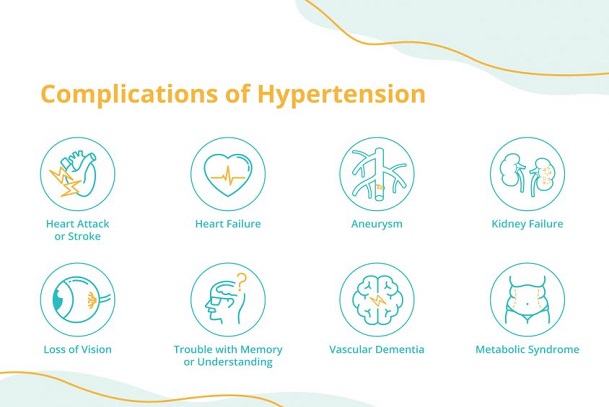Hypertension or high blood pressure can quietly damage an individual’s health in various ways before symptoms develop. These damages from hypertension occur over time when the disease goes undetected or unmanaged.
Uncontrolled high blood pressure can lead to disability, poor quality of life, a deadly heart attack or stroke, and even death. Treatment with certain medications and lifestyle changes can help control high blood pressure to reduce the risk of life-threatening complications.
Uncontrolled high blood pressure complications can cause the following:
Kidney Disease and Failure
High blood pressure can damage the blood vessels leading to the kidneys. Having diabetes in addition to high blood pressure can worsen the damage.
Kidney problems caused by high blood pressure include:
- Kidney Scarring (Glomerulosclerosis): This occurs when tiny blood vessels within the kidney become scarred and unable to effectively filter fluid and waste from the blood. Glomerulosclerosis can lead to kidney failure.
- Kidney Failure: High blood pressure is one of the most common causes of kidney failure. Damaged blood vessels prevent kidneys from effectively filtering waste from the blood, allowing dangerous levels of fluid and debris to collect. Treatment may include dialysis or a kidney transplant.
Heart Problems and Damage
High blood pressure can cause many heart problems including:
- Heart Attack: High blood pressure can damage arteries, causing hardening and thickening of the arteries which blocks and prevents blood flow to the heart muscle.
- Heart Failure: Over time, the strain on the heart caused by high blood pressure can cause the heart muscle to weaken and work less efficiently. Eventually, the heart begins to fail.
- Enlarged Left Heart: High blood pressure forces the heart to work harder to pump blood to the rest of the body. This causes the lower left heart chamber (left ventricle) to thicken. A thickened left ventricle increases the risk of heart attack, heart failure, and sudden cardiac death.
Stroke
A stroke occurs when part of the brain does not get enough oxygen and nutrients, causing brain cells to die. Blood vessels damaged by high blood pressure can narrow, rupture, or leak. High blood pressure can also cause blood clots to form in the arteries leading to the brain, blocking blood flow and potentially causing a stroke.
Other stroke-related complications include:
- Transient Ischemic Attack (TIA): This is sometimes called ministroke. TIA is a brief, temporary disruption of blood supply to the brain. Hardened arteries or blood clots caused by high blood pressure can cause TIA. TIA is often a warning sign of a full-blown stroke.
- Dementia: Once a stroke brings an interruption to blood flow to the brain, it can cause vascular dementia.
Aneurysm
An aneurysm can occur in the perforating arteries of the thalamus or putamen (Berry’s aneurysm). When they perforate, they can cause bleeding into these parts of the brain.
Eye Damages
High blood pressure can damage the tiny, delicate blood vessels that supply blood to the eyes, causing:
- Retinopathy: Damage to the blood vessels in the light-sensitive tissue at the back of the eye (retina) can lead to bleeding to the eye, blurred vision, and complete loss of sight. Having diabetes in addition to high blood pressure increases the risk of retinopathy.
- Fluid Buildup under the Retina (Choroidopathy): Choroidopathy can result in distorted vision or sometimes scarring that impairs vision.
- Nerve Damage (Optic Neuropathy): Blocked blood flow can damage the optic nerve, leading to bleeding within the eye or vision loss.
 Wash your hands regularly and wear a face mask.
Learn more
Wash your hands regularly and wear a face mask.
Learn more
